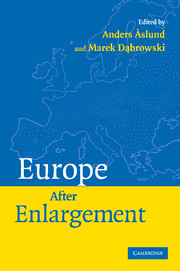Book contents
- Frontmatter
- Contents
- List of Charts, Tables, and Boxes
- Contributors
- Acknowledgments
- Introduction
- 1 Has Europe Lost Its Heart?
- 2 Economic Implications of the Social Provisions of the Stalled EU Constitution
- 3 Fiscal Policy and Fiscal Rules in the European Union
- 4 Design and Implementation of the Stability and Growth Pact: The Perspective of New Member States
- 5 Perspectives on the Lisbon Strategy: How to Increase European Competitiveness
- 6 Is Europe Reforming? Evidence from Cross-Country Structural Indicators
- 7 Recovery Growth as a Stage of Post-Socialist Transition
- 8 Comparative Oligarchy: Russia, Ukraine, and the United States
- 9 The Economic Rationale of the “European Neighbourhood Policy”
- 10 Economic Integration of Eurasia: Opportunities and Challenges of Global Significance
- Index
- References
4 - Design and Implementation of the Stability and Growth Pact: The Perspective of New Member States
Published online by Cambridge University Press: 04 December 2009
- Frontmatter
- Contents
- List of Charts, Tables, and Boxes
- Contributors
- Acknowledgments
- Introduction
- 1 Has Europe Lost Its Heart?
- 2 Economic Implications of the Social Provisions of the Stalled EU Constitution
- 3 Fiscal Policy and Fiscal Rules in the European Union
- 4 Design and Implementation of the Stability and Growth Pact: The Perspective of New Member States
- 5 Perspectives on the Lisbon Strategy: How to Increase European Competitiveness
- 6 Is Europe Reforming? Evidence from Cross-Country Structural Indicators
- 7 Recovery Growth as a Stage of Post-Socialist Transition
- 8 Comparative Oligarchy: Russia, Ukraine, and the United States
- 9 The Economic Rationale of the “European Neighbourhood Policy”
- 10 Economic Integration of Eurasia: Opportunities and Challenges of Global Significance
- Index
- References
Summary
Introduction
Since their entry into the European Union in May 2004, the larger new member states (Czech Republic, Poland, Hungary, and Slovakia) have been subjected to the Excessive Deficit Procedure (EDP) of the Stability and Growth Pact (SGP) (Box 4.1). Subsequently, the EU has even declared Hungary in a state of excessive deficit. This pattern contrasts with the EU's prior experience. In the past, entry into the European Monetary Union (EMU) was a powerful mechanism to induce EU members, such as Italy, to adjust fiscal policies. In the last few years, however, the SGP has ceased to be an effective constraint on fiscal policy in EU countries.
The decision of the European Council of Economic Ministers (ECOFIN) to halt the EDP for France and Germany has weakened the credibility of EU fiscal rules. The reform of the SGP introduced in March 2005 further worsened the situation by expanding the list of circumstances that allows countries to breach the deficit ceiling of 3 percent of GDP. Countries are now excused not only for exceptional circumstances, such as a decline in output of 2 percent or more, but also for persistent economic slowdowns or for reforms, such as pension reform, that adversely affect the budget. The horizon for adjusting the budget deficit has been lengthened. The special treatment of France and Germany and the SGP reform have sharply increased the arbitrariness in the evaluation of fiscal policy and in the implementation of the SGP. The clear targets and constraints that acceptance to the Eurozone and the SGP once provided for the ten new member states (NMS) have become elusive and “flexible.”
- Type
- Chapter
- Information
- Europe after Enlargement , pp. 65 - 84Publisher: Cambridge University PressPrint publication year: 2007

